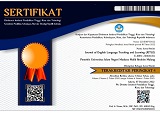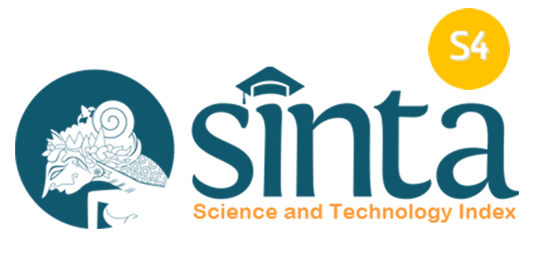Creating realistic scenarios in teaching speaking skill through virtual English camp Covid 19
Abstract
The purpose of this study is to determine whether creating realistic scenarios (CRS) for teaching speaking skills through a Virtual English Camp is beneficial in improving students' speaking skills (VEC). Determine the impact of generating a realistic scenario through VEC on improving the capacity of English major students to deliver speeches, participate in public speaking events, participate in discussions, and participate in the debate. This study is an experiment involving a one-group pre-test and post-test design, as well as a survey design to determine the overall average of the scores. The participant of this study is 145 college students of English Majors from South Kalimantan, Indonesia. They put out a significant effort to improve their communication skills. Their trainer trained them and compelled them to refrain from acting as a language instructor during the discussion program, and instead to speak in the target language, which was English, throughout the program. During this study, it was found that students who were taught with VEC thereafter had higher post-test scores than students who were taught before they were tested for their communicative competence. Students' communicative competence increases significantly when they participate in the VEC model program to teach them speaking abilities.
Keywords
Full Text:
PDFReferences
Akbari, Elham. Naderi, Ahmad. Simons, P.R.J. Pilot, Albert. (2016). Student engagement and foreign language learning through online social networks. Asian-Pacific Journal of Second and Foreign Language Education. 1(1). doi:10.1186/s40862-016-0006-7.
Barron, B., Martin, C. K., Takeuchi, L., & Fithian, R. (2009). Parents as learning partners in the development of technological fluency. International Journal of Learning and Media, 1(2), 55–77. https://doi.org/10.1162/ijlm.2009.0021
Garst, B. A., Browne, L. P., & Bialeschki, M. D. (2011). Youth development and the camp experience. New Directions for Youth Development, 2011(130), 73–87. https://doi.org/10.1002/yd.398
Chen, F.C., & Wang, T. C. (2009). Social conversation and effective discussion in online group learning. Educational Technology Research and Development, 57(5), 587–612. https://doi.org/10.1007/s11423-009-9121-1
Cho, M. H. (2012). Online student orientation in higher education: A developmental study. Educational Technology Research and Development, 60(6), 1051–1069. https://doi.org/10.1007/s11423-012-9271-4
Cohen, S. L., & Payiatakis, D. (2002). E-learning: Harnessing the hype. Performance Improvement, 41(2), 7–15. https://doi.org/10.1002/pfi.4140410204
Dahl, T. I., Sethre-Hofstad, L., & Salomon, G. (2013). Intentionally designed thinking and experience spaces: What we learned at summer camp. Learning Environments Research, 16(1), 91–112. https://doi.org/10.1007/s10984-012-9124-4
Laat, M. D., Lally, V., Lipponen, L., & Simons, R.-J. (2007). Online teaching in networked learning communities: A multi-method approach to studying the role of the teacher. Instructional Science, 35(3), 257–286. https://doi.org/10.1007/s11251-006-9007-0
Dragoo, A., & Barrows, R. (2016). Implementing competency-based education: Challenges, strategies, and a decision-making framework. The Journal of Continuing Higher Education, 64(2), 73–83. https://doi.org/10.1080/07377363.2016.1172193
Frick, T. W., Chadha, R., Watson, C., & Zlatkovska, E. (2010). Improving course evaluations to improve instruction and complex learning in higher education. Educational Technology Research and Development, 58(2), 115–136. https://doi.org/10.1007/s11423-009-9131-z
Garrett‐Rucks, P. (2013). A discussion-based online approach to fostering deep cultural inquiry in an introductory language course. Foreign Language Annals, 46(2), 191–212. https://doi.org/10.1111/flan.12026
Gorsky, P., & Caspi, A. (2005). A critical analysis of transactional distance theory. Quarterly Review of Distance Education, 6(1), 1–11.
Reinders, H., & Pegrum, M. (2017). Supporting language learning on the move: An evaluative framework for mobile language learning resources. In B. Tomlinson (Ed.), Second Language Acquisition Research and Materials Development for Language Learning (pp. 116–141). Routledge.
Herrera Díaz, L. E., & González Miy, D. (2017). Developing the oral skill in online English courses framed by the community of inquiry. PROFILE Issues in Teachers’ Professional Development, 19(1), 73. https://doi.org/10.15446/profile.v19n1.55957
Landsberger, J. (2005). E-learning by design: Teaching Teams: An interview with Hal Larson and Karen Lutrick. TechTrends, 49(2), 9–13. https://doi.org/10.1007/BF02773964
Lin, C.-L., Jin, Y. Q., Zhao, Q., Yu, S.-W., & Su, Y.-S. (2021). Factors influence students’ switching behavior to online learning under Covid-19 pandemic: A Push–Pull–Mooring model perspective. The Asia-Pacific Education Researcher, 30(3), 229–245. https://doi.org/10.1007/s40299-021-00570-0
Liu, Kuo-Ping. Tai, Shu-Ju Diana. Liu, Chen-Chung. (2018). Enhancing language learning through creation: the effect of digital storytelling on student learning motivation and performance in a school English course. Educational Technology Research and Development, 66 (4). p. 913–935, doi:10.1007/s11423-018-9592-z.
Marcus-Quinn, A., & Hourigan, T. (Eds.). (2021). Handbook for online learning context: Digital, mobile and open policy and practice. Springer International Publishing. https://doi.org/10.1007/978-3-030-67349-9
Rapanta, C., Maina, M., Lotz, N., & Bacchelli, A. (2013). Team design communication patterns in e-learning design and development. Educational Technology Research and Development, 61(4), 581–605. https://doi.org/10.1007/s11423-013-9306-5
Shneiderman, B., Borkowski, E. Y., Alavi, M., & Norman, K. (1998). Emergent patterns of teaching/learning in electronic classrooms. Educational Technology Research and Development, 46(4), 23–42. https://doi.org/10.1007/BF02299671
Sriharan, A. (2020). Teaching online: Tips for engaging students in virtual classrooms. Medical Science Educator, 30(4), 1673–1675. https://doi.org/10.1007/s40670-020-01116-7
Tai, L. (2008). Corporate e-Learning: An inside view of IBM’s solutions. Oxford University Press, USA.
White, P., & Rutherford, S. (2002). The wired classroom: Dream and reality. College & Research Libraries News, 63(9), 642–645. https://doi.org/10.5860/crln.63.9.642
Zong, X., & Cheah, C. S. L. (2021). Multiple dimensions of religiosity, self-regulation, and psychological adjustment among emerging adults. Current Psychology. https://doi.org/10.1007/s12144-021-01780-x
DOI: https://doi.org/10.18860/jetle.v4i1.17983
Refbacks
- There are currently no refbacks.
Jalan Gajayana 50 Malang 65144, Jawa Timur, Indonesia

This work is licensed under a Creative Commons Attribution-ShareAlike 4.0 International License.
Indexed by






